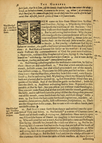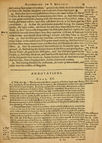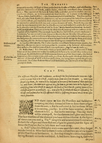The Pharisees of Jerusalem coming so far to carp him, he chargeth with a tradition contrary to God’s commandment. (10) And to the People he yieldeth the reason of that which they reproved: (15) and again to his Disciples, showing the ground of the Pharisaical washing (to wit, that meats otherwise defile the soul) to be false. (21) Then he goeth aside to hide himself among the Gentiles; where, in a woman he findeth such faith, that he is fain, lest the Gentiles should before the time extort the whole bread, as she had a crumb, to return to the Jews. (34) Where (all contrary to those Pharisees) the common People seek wonderfully unto him: and he after he hath cured their diseased, feedeth 4000 of them with seven loaves.
THEN came to him from Jerusalem Scribes and Pharisees, saying: 2Why do thy Disciples transgress the tradition of the Ancients? For they wash not their hands when they eat bread. 3But he answering said to them: Why do you also transgress the commandment of God for your tradition? For God said, 4Honour father and mother. And: He that shall curse father or mother, dying let him die. 5But you say: whosoever shall say to father or mother, the gift whatsoever proceedeth from me, shall profit thee: 6And shall not honour his father or his mother: and you have made frustrate the commandment of God for your own tradition. 7Hypocrites, well hath Esay Prophesied of you, saying: 8This people honoureth me • with their lips: but their heart is far from me. 9And in vain do they worship me, teaching doctrines and • commandments of men.
10And having called together the multitudes unto him, he said to them: Hear ye and understand. 11 • Not that which entereth into the mouth, defileth a man: but that which proceedeth out of the mouth, that defileth a man. 12Then came his Disciples, and said to him: Dost thou know that the Pharisees, when they heard this word, were scandalised? 13But he answering said: All planting which my Heavenly Father hath not planted, shall be rooted up. 14Let them alone: blind they are, guides of the blind. And if the blind be guide to the blind, both fall into the ditch. 15And Peter answering said to him: Expound us this parable. 16But he said: Are you also as yet without understanding? 17Do you not understand, that all that entereth into the mouth, goeth into the belly, and is cast forth into the privy? 18But the things that proceed out of the mouth, come forth from the heart, and those things • defile a man. 19For from the heart come forth evil cogitations, murders, advoutries, fornications, thefts, false testimonies, blasphemies. 20These are the things that defile a man. But to eat with unwashed hands, doth not defile a man.
21And Jesus went forth from thence and retired into the quarters of Tyre and Sidon. 22And behold * a woman of Chanaan came forth out of those coasts, and crying out, said to him: Have mercy upon me, O lord the Son of David: my daughter is sore vexed of a Devil. 23Who answered her not a word. And his Disciples came and besought him saying: Dismiss her, because she crieth out after us. 24And he answering said: I was not sent but to the sheep that are lost of the house of Israel. 25But she came and adored him, saying: Lord, help me. 26Who answering, said: It is not good to take the bread of the Children, and to cast it to the dogs. 27But she said: Yea lord; for the whelps also eat of the crumbs that fall from the table of their masters. 28Then Jesus answering said to her, O woman, [a] great is thy faith: be it done to thee as thou wilt: And her daughter was made whole from that hour.
29And when Jesus was passed from thence, he came beside the sea of Galilee: and ascending into the mountain, sat there. 30And there came to him great multitudes, having with them dumb persons, blind, lame, feeble, and many others: and they cast them down at his feet, and he cured them: 31so that the multitudes marvelled seeing the dumb speak, the lame walk, the blind see: and they magnified the God of Israel. 32And * Jesus called together his Disciples, and said: I pity the multitude because three days now they continue with me, and have not what to eat: and dismiss them fasting I will not, lest they faint in the way. 33And the Disciples say unto him: whence then may we get so many loaves in the desert as to fill so great a multitude? 34And Jesus said to them: How many loaves have you? But they said, Seven, and a few little fishes. 35And he commanded the multitude to sit down upon the ground. 36And taking the Seven loaves and the fishes, and giving thanks, he broke, and gave to his Disciples, and [b] the Disciples gave to the People. 37And they did all eat, and had their fill. And that which was left of the fragments they took up, seven baskets full. 38And there were that did eat, four thousand men, beside children and women.
39And having dismissed the multitude, he went up into a boat, and came into the coasts of Magedan.
Footnotes
- ↑ It were a strange case that Christ should commend in this woman a sole faith without good works, that is to say, a dead faith such as could not work by love, and which St. James doubted not to call the faith of Christians but of Devils. Aug de Fid. et Op. ch. 16.
- ↑ Here we see again that the People must not be their own carvers, nor receive the Sacraments or other spiritual sustenance immediately of Christ, or at their own hand, but of their spiritual governors.
ANNOTATIONS. CHAP. XV.
↑ 8. With their lips.) This is to be understood properly of such as have ever God in their mouth, the Word of our Lord, the Scriptures, the Ghospel, but in their heart and all their life be indeed Godless. It may be applied also to such as say their prayers without attention or elevation of mind to God, whether he understand the prayers or no, that saith them. For many a poor Christian man that understandeth not the words he speaketh, hath his heart nearer Heaven, more fervour and devotion, more edification to himself, more profit in spirit (as the Apostle speaketh) and less distractions, than not only all Heretics which have no true feeling of such things, but than many learned Catholics. And therefore it is not to be understood of praying in unknown tongues, as Heretics sometime expound it, far wide from the circumstance of the place and Christ’s intention, speaking of the hypocritical Jews.
↑ 9. Commandments of men.) Such only are here called traditions, doctrines, or commandments of men, which be either repugnant to God’s laws, as this of defrauding their parents under pretence of religion: or which at the least be frivolous, unprofitable, and impertinent to piety or true worship, as that other sort of so often washing hands, and vessels, without regard of inward purity of heart and mind. Let no man therefore be abused with the Protestant’s perverse application of this place against the holy laws, canons, and precepts of the Church and our spiritual Governors, concerning fasts, festivities, and other rules of discipline, and due order in life, and in the service of God. For such are not repugnant but consonant to God’s Word and all piety, and our Lord is truly honoured, worshipped, and served both by the making and also by the observing of them. * St. Paul gave commandment both by his epistles, and by word of mouth, even in such matters wherein Christ had prescribed nothing at all, and he chargeth the Faithful to observe the same. * The Apostles and Priests at Jerusalem made laws, and the Christians were bound to obey them. a The keeping of Sunday instead of the Sabboth is the tradition of the Apostles: and dare the Heretics deny the due observation thereof to be an acceptable worship of God? b They prescribed the Feasts of Easter, and whitsuntide, and other Solemnities of Christ, and his Saints, which the Protestants themselves observe. c. They appointed the Lent and Ember fasts and other, as well to chastise the concupiscence of man, as to serve and please God thereby, as is plain in the fasting of * Anna, Tobie, Judith, Esther; who served and pleased God thereby. Therefore neither these nor other such Apostolic Ordinances, nor any precepts of the holy Church, or of our lawful Pastors, are implied in these Pharisaical traditions here reprehended; nor to be counted or called the doctrines and commandments of men, because they are not made by mere human power, but by Christ’s warrant and authority, and by such as he has placed to rule his Church, of whom he saith: * He that heareth you, heareth me: he that despiseth you, despiseth me. They are made by the Holy Ghost, joining with our Pastors in the regiment of the Faithful. They are made by our Mother the Church, which whosoever obeyeth not, * we are warned to take him as a Heathen. But on the other side, all laws, doctrines, services, and injunctions of Heretics, howsoever pretended to be consonant to the Scriptures, be commandments of men: because both the things by them prescribed are impious, and the Authors have neither sending nor commission from God.
↑ 11. Not that which entereth.) The Catholics do not abstain from certain meats, for that they esteem any meat unclean, either by creation, or by Judaical observation: they abstain for chastisement of their concupiscences. Aug. lib. de. mor. Ec. Cath. ch. 33.
↑ 18. Defile a man.) It is sin only, which properly defileth man, and meats of themselves or of their own nature do not defile, but so far as by accident they make a man to sin, as the disobedience of God’s commandment, or of our Superiors, who forbid some meats for certain times, and causes, is a sin. As the apple which our first parents did eat of, though of itself it did not defile them, yet being eaten against the precept, it did defile. So neither flesh nor fish of itself doth defile, but the breach of the Church’s precept defileth.
Margin Notes
- 1–20. The Ghospel upon Wednesday the 3rd week in Lent.
- 21–28. The Ghospel upon Thursday the first week in Lent.
- annot. 9. The difference between the Jewish traditions here reprehended, and the Church’s Apostolical traditions.
- annot. 11. Difference of meats.
- annot. 18. Catholic abstinence.
Margin References
- 1. Mar. 7, 1.
- 4. Exo. 20, 12.
- 4. Lev. 20, 9.
- 8. Esa. 29, 13.
- 22. Mar. 7, 25.
- 32. Mar. 8, 1.
- annot. 8. 1 Cor. 14.
- annot. 9. 2 Thes. 2, 15. 1 Cor. 11.
- annot. 9. Act. 15.
- annot. 9. a. Aug. Ser. de temp. See 1 Cor. 16:2.
- annot. 9. b. Epiph. haer. 75.
- annot. 9. c. Jero. ep. 54 ad Marcel. contra Mont.
- annot. 9. Luc. 2, 37. Tob. 12. Jud. 8. Est. 4.
- annot. 9. Luc. 10:16.
- annot. 11. Mat. 18, 17.
- annot. 18. Gen. 3.




